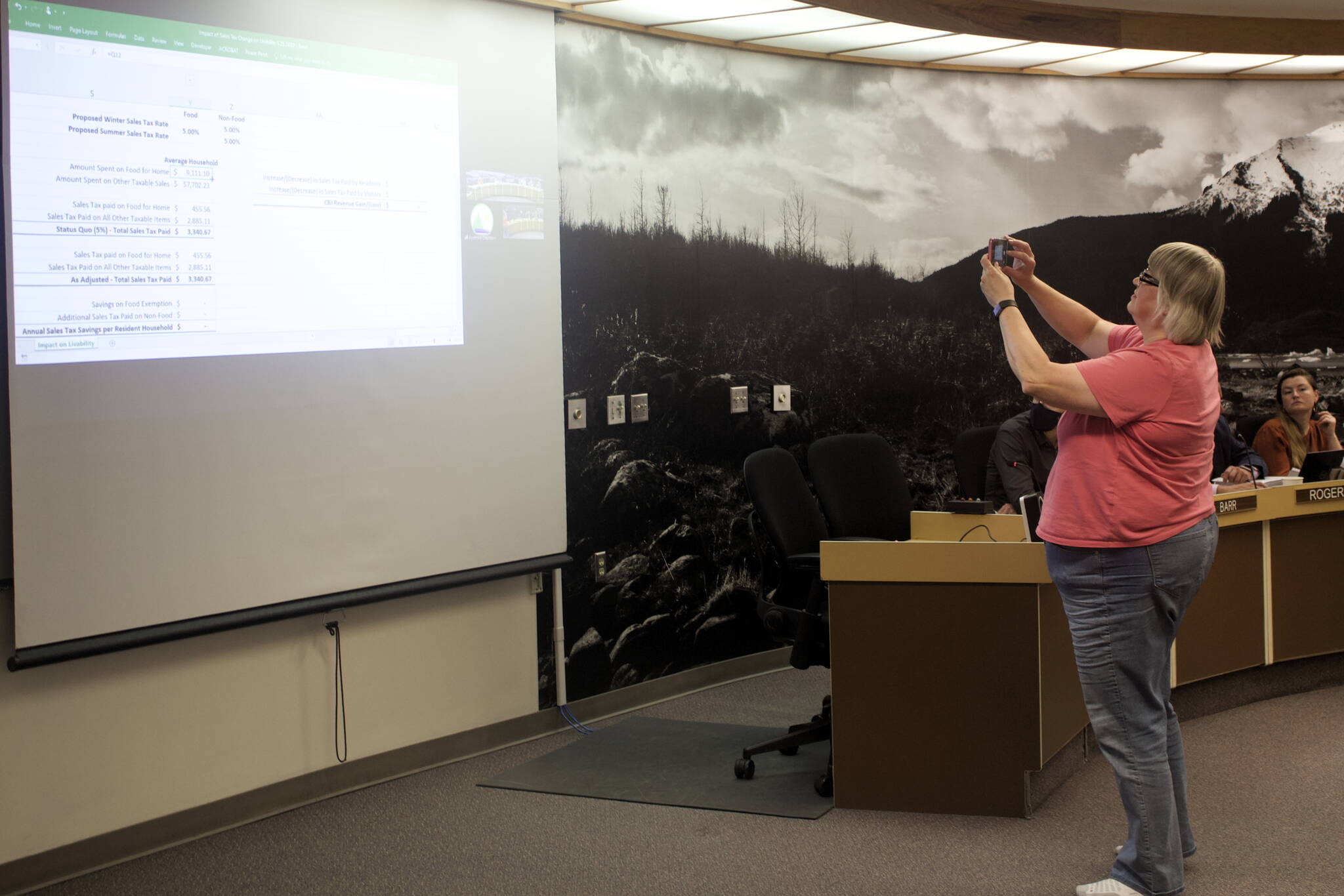A proposed local sales tax exemption for food is dead — for now. Instead, Juneau residents may see an advisory vote in the Oct. 4 municipal election asking if they favor the exemption in exchange for raising sales taxes on other items or increasing property taxes.
A long and contentious debate in recent months about exempting non-prepared foods from the city’s 5% sales tax, which advocates say will help low-income residents, effectively ending the possibility of such a policy in the immediate future during the Juneau Assembly’s Finance Committee meeting Wednesday.
Exempting food from sales taxes means the city would need to make up for about $6 million in lost revenue. Committee members disagreed sharply about their preference among a trio of options: boosting the sales tax to 6% during summer months, a year-round 5.5% sales tax, or a 1 mill property tax increase.
Ultimately the answer was none of the above — at least until there’s a better sense of what voters prefer.
“Just hearing the Assembly members talk I think we’re pretty divided on this,” said Mayor Beth Weldon, who floated the idea of an advisory vote early during the evening’s two-hour discussion. “I think we’re all looking for a clearer answer.”
Part of the stalemate was due to the various proposals being more, or less, attractive than they appear at first glance due to complexities that could result in consequences beyond those intended.
[Food sales tax exemption likely to appear on municipal ballots]
Increasing sales taxes on non-food items during a six-month period from April through September is seen as a way of putting some of the burden on tourists, for example, but opponents said it will significantly hurt local businesses not catering to tourists during those months.
“I’m so opposed to this I would not even support this on an advisory vote,” said Assembly member Wade Bryson, who has been the strongest voice opposing the seasonal sales tax hike during this year’s discussions.
Significant opposition has also been expressed by numerous business owners and the Greater Juneau Chamber of Commerce, whose additional arguments are targeting tourists is unfair since they drive much of the local summer economy and changing point-of-sale systems twice a year can be more complex than people realize, City Finance Director Jeff Rogers wrote in a memo to Finance Committee members.
A major problem with a year-round 5.5% sales tax is it wouldn’t generate nearly enough to cover the loss of food taxes — to avoid a deficit a 5.7% year-round rate would have to be imposed, Rogers noted.
On the other hand, a 1 mill increase in the current 10.56 mill property tax rate — which means the owner of a $500,000 home would pay $500 more a year in taxes — might seem politically and practically undesirable, especially given recent skyrocketing property values. But arguments in favor, led by Assembly member Alicia Hughes-Skandijs, assert it’s actually the fairest approach if the goal of a food-tax exemption is helping those with lower incomes since the burden is shifted to property owners relative to their presumed wealth.
“My only lament was not being more open to the idea,” Assembly member Greg Smith said after proponents of the mill rate hike made their case. “I guess a big issue for me is it would be really quick acting and we would be making this choice in two weeks (to get it on the ballot in time), and not getting a chance to hear from the public. I think it’s too quick to do it this year.”
Several Assembly members also express concern about the food tax exemption – especially if paid for with some form of sales tax increase – appearing on the same ballot this fall as an extension of a “temporary” 1% sales tax that’s been in place since the early 1990s as voters have renewed it roughly every five years. Bryson noted residents may also be asked to approve a bond to pay for a new City Hall on the same ballot.
“If we ask those major questions and then ask the (food-related) sales tax questions we’re setting ourselves up for failure,” he said.
Motions to move forward in the process of putting the seasonal taxes tax and year-round sales tax on the fall ballot — which would first require approval by the full Assembly after a public hearing — both failed by 5-4 votes. Opposing the seasonal sales tax were Weldon, Bryson, Hughes-Skandijs, Assembly member Carole Triem and Assembly member Michelle Hale. Opposing the year-round increase were Hughes-Skandijs, Triem, Assembly member Maria Gladziszewski, Assembly member Wáahlaal Gíidaak Barbara Blake and Assembly member Christine Woll.
Both options could still appear as advisory questions on the fall ballot. In addition, a motion to keep the mill tax rate increase option as a possibility when discussing an advisory vote was unanimously approved by the committee.
Weldon, in proposing the advisory vote, said she isn’t personally taking a stance on exempting food from sales tax and “I understand the argument on both sides.” But she doesn’t consider it unreasonable to wait a year before again considering concrete action so city leaders have a better sense of what the people who elected them want.
“I’m not trying to squash anything,” she said. “I’ve stood out of the way because I know it’s important to several members of the Assembly. Like our housing dilemma I’m just trying to find a clearer answer.”
• Reach Mark Sabbatini at mark.sabbatini@juneauempire.com

